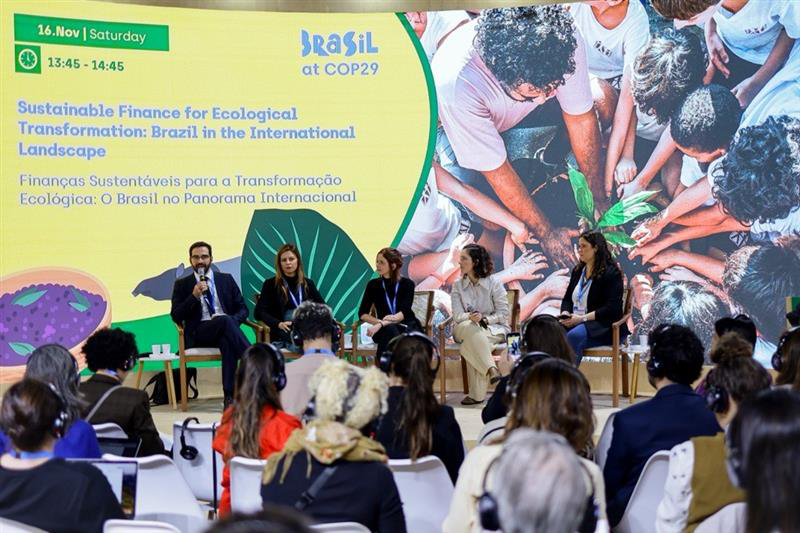The impact of climate change on oceans, plastic pollution, sustainable finance, and eco-tourism were among the topics discussed at the Brazilian Trade and Investment Promotion Agency’s (ApexBrasil) space in Azerbaijan, the final stop before COP30 in Belém in 2025.
* Translated with AI
The Brazil Pavilion at COP29 (the 2024 United Nations Climate Change Conference) in Baku, Azerbaijan, centered on the theme "Pathways to Ecological Transformation," hosted seven marathon panels on Saturday (Nov. 16) during the event's Science Day. A key focus was the shift toward a new economic production model.
In the panel "Sustainable Finance for Ecological Transformation: Brazil in the International Panorama," discussions centered on Brazil’s potential to lead innovative, low-carbon solutions. However, participants also highlighted that the financing gap poses a significant challenge for the country to achieve its ambitious climate goals.
Nabil Kadri, Superintendent of the Environment Division at the Brazilian Development Bank (BNDES), emphasized the importance of reactivating the Amazon Fund, the largest forest fund globally, and the Climate Fund, which were previously frozen but now have support from international donors. "No other country is taking the steps Brazil is to finance low-carbon projects. With internal political will, we can innovate financial tools to mobilize international resources for the climate agenda," Kadri noted. He announced allocations of BRL 10 billion for the Climate Fund, with the potential to grow to BRL 20 billion next year.
Carolina Grottera, Program Director at the Ministry of Finance’s Executive Secretariat, coordinating the Ecological Transformation Plan, pointed out that 70% of climate action resources in developing countries come from public funds. "Private sector engagement is lacking in these regions. We must be creative because other countries engage in trade wars and allocate far more public and private resources to energy transformation than Brazil," Grottera said. She reaffirmed the Ministry of Finance’s strong commitment to Brazil's fiscal framework, which replaced the previous spending cap introduced during Michel Temer's administration.
Patricia Ellen, Managing Partner and CEO of Systemiq Latam and President of Instituto AYA, which focuses on decarbonizing Brazil's economy, discussed efforts to unlock sustainable finance within the private sector. "If we don't redesign global supply chains, developing countries will be left out of the global decarbonization movement," Ellen warned.
Representing civil society, Sandra Paula Bonetti, Director of the National Confederation of Agricultural Workers (Contag), highlighted the role of family farming and traditional communities in driving ecological transformation. "We are responsible for much of the shift in our production system. Beyond greening the economy, we face internal challenges to seize social opportunities for workers," she said, calling for renewed discussions on land regularization and agrarian reform. Kadri of BNDES echoed her sentiments, stating, "We need to transform this climate potential into social and environmental strength."
Ecological Transformation Pact
Following this panel, the discussion turned to the "Ecological Transformation Pact," launched in August 2023 by President Lula to unite Brazil's three branches of government in prioritizing the ecological agenda. "This administration created the Ecological Transformation Pact, currently under implementation and delivered to the Ministry of Finance," said Jorge Messias, Attorney General of the Union, who moderated the panel.
Highlighting the Pact’s legislative achievements, Fernanda Santiago, Special Advisor to the Minister of Finance, noted, "The Pact prioritizes environmental litigation at the Supreme Court and advances key bills in Congress, such as the Senate's recent approval of regulated carbon markets."
Federal Deputy Nilto Tatto (PT-SP), Coordinator of the Environmentalist Parliamentary Front, emphasized the urgency of addressing extreme climate events. "Poor nations, which bear no responsibility for global warming, are the ones suffering the most from its effects," he noted. Speaking for the judiciary, Minister Antonio Herman Benjamin of the Superior Court of Justice stressed the critical role of judges in ecological advocacy. "Judges cannot hinder this transformation and must support these urgent changes."
Oceans and Climate Change
In the panel "The Ocean-Climate Nexus and Society," international experts examined how climate change affects oceans and the opportunities for adaptation they present. Topics included blue financing—public, private, and alternative funds dedicated to climate action. Carolina Fávero de Souza, General Coordinator for Sustainable Tourism at the Ministry of Tourism, highlighted Brazil’s vast coastline and navigable waterways, noting their critical role in tourism. However, she warned of threats such as sea-level rise, ocean acidification, and extreme climate events.
Moacyr Araújo, Vice-Rector of the Federal University of Pernambuco (UFPE) and Coordinator of Brazil’s Climate Change Research Network, called for coral reef and mangrove preservation as protective barriers against climate extremes. Pedro Prata, Latin America Policy Director for the Ellen MacArthur Foundation, addressed plastic pollution, advocating for an international convention to curb it, particularly in marine environments.
Water and Climate
The penultimate panel, "Water and Climate: Solutions and Governance," tackled water scarcity and ecosystem restoration. Malu Ribeiro, Policy Director at the SOS Mata Atlântica Foundation, lamented that access to water is not yet a constitutional right in Brazil. She also highlighted a 55% reduction in deforestation in the Atlantic Forest compared to the previous year, calling it progress toward zero deforestation.
Local Best Practices
The final panel showcased municipalities' efforts to combat climate change, featuring initiatives from Goiânia (GO), Paragominas (PA), Santo André (SP), and São Paulo (SP). Notable projects included Santo André's "Green Currency" program, which exchanges recyclable materials for fresh produce, and São Paulo’s electrification of its bus fleet.
Brazil Pavilion
The Brazil Pavilion at COP29 is a strategic partnership between ApexBrasil and various government and private sector organizations, including the Ministry of Foreign Affairs, Ministry of Finance, and Ministry of the Environment. Sponsors include BNDES, Banco do Brasil, Caixa Econômica Federal, Banco da Amazônia, Sebrae, CNT, CNI, Itaú, and the Instituto Clima e Sociedade.
COP29 in Baku runs until November 22. The Brazil Pavilion will continue hosting discussions and presentations on Brazil’s climate initiatives and sustainable economic development strategies.
Live and recorded sessions of the Brazil Pavilion program are available on ApexBrasil's YouTube channel. Check the full schedule [here].

